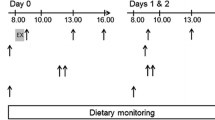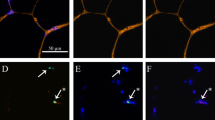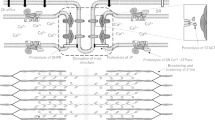Abstract
Human skeletal muscle satellite cells (SCs) are essential for muscle regeneration and remodeling processes in healthy and clinical conditions involving muscle breakdown. However, the potential influence of protein supplementation on post-exercise SC regulation in human skeletal muscle has not been well investigated. In a comparative human study, we investigated the effect of hydrolyzed whey protein supplementation following eccentric exercise on fiber type-specific SC accumulation. Twenty-four young healthy subjects received either hydrolyzed whey protein + carbohydrate (whey, n = 12) or iso-caloric carbohydrate (placebo, n = 12) during post-exercise recovery from 150 maximal unilateral eccentric contractions. Prior to and 24, 48 and 168 h post-exercise, muscle biopsies were obtained from the exercise leg and analyzed for fiber type-specific SC content. Maximal voluntary contraction (MVC) and serum creatine kinase (CK) were evaluated as indices of recovery from muscle damage. In type II fiber-associated SCs, the whey group increased SCs/fiber from 0.05 [0.02; 0.07] to 0.09 [0.06; 0.12] (p < 0.05) and 0.11 [0.06; 0.16] (p < 0.001) at 24 and 48 h, respectively, and exhibited a difference from the placebo group (p < 0.05) at 48 h. The whey group increased SCs/myonuclei from 4 % [2; 5] to 10 % [4; 16] (p < 0.05) at 48 h, whereas the placebo group increased from 5 % [2; 7] to 9 % [3; 16] (p < 0.01) at 168 h. MVC decreased (p < 0.001) and muscle soreness and CK increased (p < 0.001), irrespective of supplementation. In conclusion, whey protein supplementation may accelerate SC proliferation as part of the regeneration or remodeling process after high-intensity eccentric exercise.





Similar content being viewed by others
References
Atherton PJ, Smith K (2012) Muscle protein synthesis in response to nutrition and exercise. J Physiol 590:1049–1057. doi:10.1113/jphysiol.2011.225003
Averous J, Gabillard JC, Seiliez I, Dardevet D (2012) Leucine limitation regulates myf5 and myoD expression and inhibits myoblast differentiation. Exp Cell Res 318:217–227. doi:10.1016/j.yexcr.2011.10.015
Bijur PE, Silver W, Gallagher EJ (2001) Reliability of the visual analog scale for measurement of acute pain. J Soc Acad Emerg Med 8:1153–1157
Bischoff R (1990) Interaction between satellite cells and skeletal muscle fibers. Development 109:943–952
Brack AS, Rando TA (2012) Tissue-specific stem cells: lessons from the skeletal muscle satellite cell. Cell Stem Cell 10:504–514. doi:10.1016/j.stem.2012.04.001
Buckley JD, Thomson RL, Coates AM, Howe PR, DeNichilo MO, Rowney MK (2010) Supplementation with a whey protein hydrolysate enhances recovery of muscle force-generating capacity following eccentric exercise. J Sci Med Sport 13:178–181
Burd NA et al (2011) Enhanced amino acid sensitivity of myofibrillar protein synthesis persists for up to 24 h after resistance exercise in young men. J Nutr 141:568–573. doi:10.3945/jn.110.135038
Burke L, Deakin V (2000) Clinical sports nutrition, 2nd edn. McGraw-Hill, Beijing, Boston
Cermak NM et al (2012) Eccentric exercise increases satellite cell content in type II muscle fibers. Med Sci Sports Exerc 45(2):230–237. doi:10.1249/MSS.0b013e318272cf47
Christov C et al (2007) Muscle satellite cells and endothelial cells: close neighbors and privileged partners. Mol Biol Cell 18:1397–1409. doi:10.1091/mbc.E06-08-0693
Conboy IM, Conboy MJ, Wagers AJ, Girma ER, Weissman IL, Rando TA (2005) Rejuvenation of aged progenitor cells by exposure to a young systemic environment. Nature 433:760–764. doi:10.1038/nature03260
Cosgrove BD et al (2014) Rejuvenation of the muscle stem cell population restores strength to injured aged muscles. Nat Med. doi:10.1038/nm.3464
Crameri RM et al (2004) Changes in satellite cells in human skeletal muscle after a single bout of high intensity exercise. J Physiol 558:333–340. doi:10.1113/jphysiol.2004.061846
Crameri RM, Aagaard P, Qvortrup K, Langberg H, Olesen J, Kjaer M (2007) Myofibre damage in human skeletal muscle: effects of electrical stimulation versus voluntary contraction. J Physiol 583:365–380. doi:10.1113/jphysiol.2007.128827
Dibble CC, Manning BD (2013) Signal integration by mTORC1 coordinates nutrient input with biosynthetic output. Nat Cell Biol 15:555–564. doi:10.1038/ncb2763
Dickinson JM et al (2011) Mammalian target of rapamycin complex 1 activation is required for the stimulation of human skeletal muscle protein synthesis by essential amino acids. J Nutr 141:856–862. doi:10.3945/jn.111.139485
Farup J et al (2012) Muscle morphological and strength adaptations to endurance vs. resistance training. J Strength Cond Res 26:398–407. doi:10.1519/JSC.0b013e318225a26f
Farup J et al (2013) Whey protein hydrolysate augments tendon and muscle hypertrophy independent of resistance exercise contraction mode. Scand J Med Sci Sports. doi:10.1111/sms.12083 (Epub ahead of print)
Fry CS et al (2014) Regulation of the muscle fiber microenvironment by activated satellite cells during hypertrophy. FASEB J 28:1654–1665. doi:10.1096/fj.13-239426
Han B, Tong J, Zhu MJ, Ma C, Du M (2008) Insulin-like growth factor-1 (IGF-1) and leucine activate pig myogenic satellite cells through mammalian target of rapamycin (mTOR) pathway. Mol Reprod Dev 75:810–817. doi:10.1002/mrd.20832
He WA et al (2013) NF-kappaB-mediated Pax7 dysregulation in the muscle microenvironment promotes cancer cachexia. J Clin Invest. doi:10.1172/JCI68523
Heinemeier KM et al (2012) GH/IGF-I axis and matrix adaptation of the musculotendinous tissue to exercise in humans. Scand J Med Sci Sports. doi:10.1111/j.1600-0838.2012.01459.x
Ito K, Suda T (2014) Metabolic requirements for the maintenance of self-renewing stem cells. Nat Rev Mol Cell Biol 15:243–256. doi:10.1038/nrm3772
Jackman SR, Witard OC, Jeukendrup AE, Tipton KD (2010) Branched-chain amino acid ingestion can ameliorate soreness from eccentric exercise. Med Sci Sports Exerc 42:962–970
Jeong J, Conboy MJ, Conboy IM (2013) Pharmacological inhibition of myostatin/TGF-beta receptor/pSmad3 signaling rescues muscle regenerative responses in mouse model of type 1 diabetes. Acta Pharmacol Sinica 34(8):1052–1060. doi:10.1038/aps.2013.67
Kirby TJ, Triplett NT, Haines TL, Skinner JW, Fairbrother KR, McBride JM (2012) Effect of leucine supplementation on indices of muscle damage following drop jumps and resistance exercise. Amino Acids 42:1987–1996. doi:10.1007/s00726-011-0928-9
Lepper C, Partridge TA, Fan CM (2011) An absolute requirement for Pax7-positive satellite cells in acute injury-induced skeletal muscle regeneration. Development 138:3639–3646. doi:10.1242/dev.067595
Mackey AL et al (2007) The influence of anti-inflammatory medication on exercise-induced myogenic precursor cell responses in humans. J Appl Physiol 103:425–431. doi:10.1152/japplphysiol.00157.2007
Mackey AL, Kjaer M, Charifi N, Henriksson J, Bojsen-Moller J, Holm L, Kadi F (2009) Assessment of satellite cell number and activity status in human skeletal muscle biopsies. Muscle Nerve 40:455–465. doi:10.1002/mus.21369
Mackey AL, Andersen LL, Frandsen U, Suetta C, Sjogaard G (2010) Distribution of myogenic progenitor cells and myonuclei is altered in women with vs. those without chronically painful trapezius muscle. J Appl Physiol (1985) 109:1920–1929. doi:10.1152/japplphysiol.00789.2010
Mackey AL et al (2011) Sequenced response of extracellular matrix deadhesion and fibrotic regulators after muscle damage is involved in protection against future injury in human skeletal muscle. FASEB J 25(6):1943–1959. doi:10.1096/fj.10-176487
Mauro A (1961) Satellite cell of skeletal muscle fibers. J Biophys Biochem Cytol 9:493–495
McKay BR, O’Reilly CE, Phillips SM, Tarnopolsky MA, Parise G (2008) Co-expression of IGF-1 family members with myogenic regulatory factors following acute damaging muscle-lengthening contractions in humans. J Physiol 586:5549–5560. doi:10.1113/jphysiol.2008.160176
McKay BR, De Lisio M, Johnston AP, O’Reilly CE, Phillips SM, Tarnopolsky MA, Parise G (2009) Association of interleukin-6 signalling with the muscle stem cell response following muscle-lengthening contractions in humans. PLoS One 4:e6027. doi:10.1371/journal.pone.0006027
McKay BR, Toth KG, Tarnopolsky MA, Parise G (2010) Satellite cell number and cell cycle kinetics in response to acute myotrauma in humans: immunohistochemistry versus flow cytometry. J Physiol 588:3307–3320. doi:10.1113/jphysiol.2010.190876
Michailidis Y et al (2013) Thiol-based antioxidant supplementation alters human skeletal muscle signaling and attenuates its inflammatory response and recovery after intense eccentric exercise. Am J Clin Nutr 98:233–245. doi:10.3945/ajcn.112.049163
Mikkelsen UR, Langberg H, Helmark IC, Skovgaard D, Andersen LL, Kjaer M, Mackey AL (2009) Local NSAID infusion inhibits satellite cell proliferation in human skeletal muscle after eccentric exercise. J Appl Physiol 107:1600–1611. doi:10.1152/japplphysiol.00707.2009
Moller AB, Vendelbo MH, Rahbek SK, Clasen BF, Schjerling P, Vissing K, Jessen N (2013) Resistance exercise, but not endurance exercise, induces IKKbeta phosphorylation in human skeletal muscle of training-accustomed individuals. Pflugers Arch 465:1785–1795. doi:10.1007/s00424-013-1318-9
Montarras D, L’Honore A, Buckingham M (2013) Lying low but ready for action: the quiescent muscle satellite cell. FEBS J 280(17):4036–4050. doi:10.1111/febs.12372
Newham DJ, Jones DA, Clarkson PM (1987) Repeated high-force eccentric exercise: effects on muscle pain and damage. Bethesda Md: 1985 63:1381–1386
Parise G (2013) Satellite cells: promoting adaptation over a lifetime. Acta Physiol (Oxf) 210(3):462–464. doi:10.1111/apha.12219
Pasiakos SM, Lieberman HR, McLellan TM (2014) Effects of protein supplements on muscle damage, soreness and recovery of muscle function and physical performance: a systematic review. Sports Med. doi:10.1007/s40279-013-0137-7 (Epub ahead of print)
Paulsen G, Mikkelsen UR, Raastad T, Peake JM (2012) Leucocytes, cytokines and satellite cells: what role do they play in muscle damage and regeneration following eccentric exercise? Exerc Immunol Rev 18:42–97
Proske U, Allen TJ (2005) Damage to skeletal muscle from eccentric exercise. Exerc Sport Sci Rev 33:98–104
Rodgers JT et al (2014) mTORC1 controls the adaptive transition of quiescent stem cells from G0 to GAlert. Nature 509:393–396
Rusu D, Drouin R, Pouliot Y, Gauthier S, Poubelle PE (2009) A bovine whey protein extract stimulates human neutrophils to generate bioactive IL-1Ra through a NF- B- and MAPK-dependent mechanism. J Nutr 140:382–391. doi:10.3945/jn.109.109645
Seale P, Sabourin LA, Girgis-Gabardo A, Mansouri A, Gruss P, Rudnicki MA (2000) Pax7 is required for the specification of myogenic satellite cells. Cell 102:777–786
Serrano AL, Baeza-Raja B, Perdiguero E, Jardi M, Munoz-Canoves P (2008) Interleukin-6 is an essential regulator of satellite cell-mediated skeletal muscle hypertrophy. Cell Metab 7:33–44. doi:10.1016/j.cmet.2007.11.011
Snijders T et al (2013) Acute dietary protein intake restriction is associated with changes in myostatin expression after a single bout of resistance exercise in healthy young men. J Nutr 144(2):137–145. doi:10.3945/jn.113.183996
Sousa-Victor P et al (2014) Geriatric muscle stem cells switch reversible quiescence into senescence. Nature 506(7488):316–321. doi:10.1038/nature13013
Tatsumi R, Sheehan SM, Iwasaki H, Hattori A, Allen RE (2001) Mechanical stretch induces activation of skeletal muscle satellite cells in vitro. Exp Cell Res 267:107–114. doi:10.1006/excr.2001.5252
Urciuolo A et al (2013) Collagen VI regulates satellite cell self-renewal and muscle regeneration. Nat commun 4:1964. doi:10.1038/ncomms2964
Vijayan K, Thompson JL, Norenberg KM, Fitts RH, Riley DA (2001) Fiber-type susceptibility to eccentric contraction-induced damage of hindlimb-unloaded rat AL muscles. J Appl Physiol 90:770–776
Vissing K, Andersen JL, Schjerling P (2005) Are exercise-induced genes induced by exercise? FASEB J 19:94–96. doi:10.1096/fj.04-2084fje
Vissing K, Overgaard K, Nedergaard A, Fredsted A, Schjerling P (2008) Effects of concentric and repeated eccentric exercise on muscle damage and calpain-calpastatin gene expression in human skeletal muscle. Eur J Appl Physiol 103:323–332. doi:10.1007/s00421-008-0709-7
Vissing K, McGee SL, Farup J, Kjolhede T, Vendelbo MH, Jessen N (2011) Differentiated mTOR but not AMPK signaling after strength vs endurance exercise in training-accustomed individuals. Scand J Med Sci Sports 23(3):355–366. doi:10.1111/j.1600-0838.2011.01395.x
Xin L, Hyldahl RD, Chipkin SR, Clarkson PM (2013) A contralateral repeated bout effect attenuates induction of NF-kappaB DNA-binding following eccentric exercise. J Appl Physiol (1985). doi:10.1152/japplphysiol.00133.2013
Yin H, Price F, Rudnicki MA (2013) Satellite cells and the muscle stem cell niche. Physiol Rev 93:23–67. doi:10.1152/physrev.00043.2011
Yu JG, Carlsson L, Thornell LE (2004) Evidence for myofibril remodeling as opposed to myofibril damage in human muscles with DOMS: an ultrastructural and immunoelectron microscopic study. Histochem Cell Biol 121:219–227. doi:10.1007/s00418-004-0625-9
Acknowledgments
We thank the participants for their participation in the project. Department of Rheumatology, Aarhus University Hospital, is thanked for supplying apparatus for blood sampling. Janni Moesgaard Jensen and Gitte Kaiser Hartvigsen are thanked for assistance in collecting blood samples and during biopsy preparation. The F1.652 and the A4.591 monoclonal antibodies developed by Helen M. Blau were obtained from the Developmental Studies Hybridoma Bank under the auspices of the NICHD and maintained by The University of Iowa, Department of Biological Sciences, Iowa City, IA, USA.
Conflict of interest
The study was funded by Arla Foods Ingredients Group P/S, DK and Nordea Foundation (Healthy Ageing grant). The authors declare that they have no conflict of interest.
Author information
Authors and Affiliations
Corresponding author
Rights and permissions
About this article
Cite this article
Farup, J., Rahbek, S.K., Knudsen, I.S. et al. Whey protein supplementation accelerates satellite cell proliferation during recovery from eccentric exercise. Amino Acids 46, 2503–2516 (2014). https://doi.org/10.1007/s00726-014-1810-3
Received:
Accepted:
Published:
Issue Date:
DOI: https://doi.org/10.1007/s00726-014-1810-3




